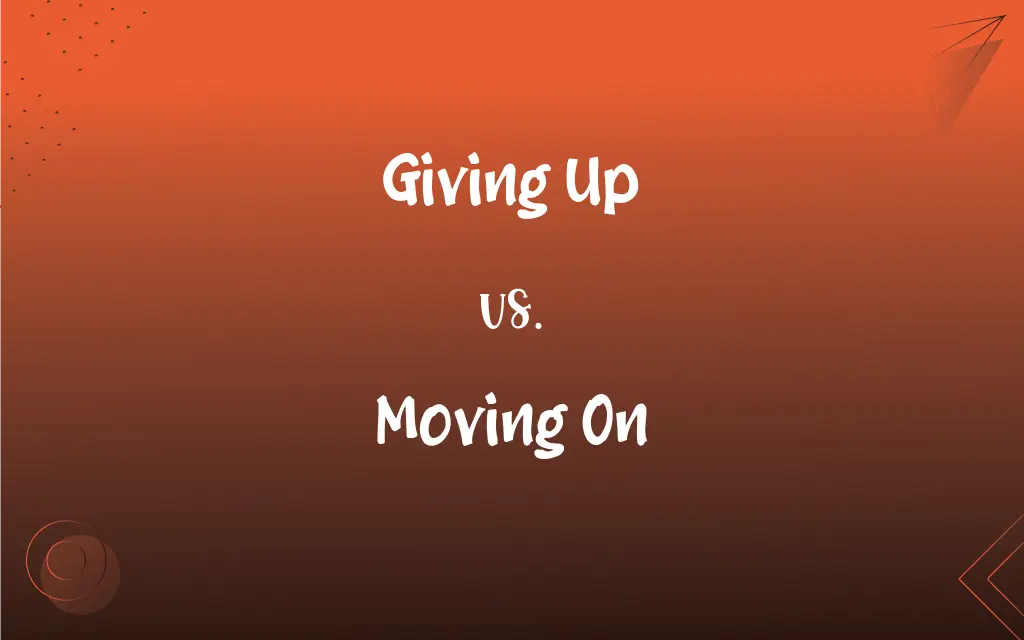Giving Up vs. Moving On: What's the Difference?
Edited by Aimie Carlson || By Janet White || Published on December 26, 2023
Giving up means to stop trying due to defeat or despair, while moving on involves leaving a situation behind to embrace new opportunities.

Key Differences
Giving up implies a sense of defeat or failure, often due to discouragement or perceived insurmountable challenges. Moving on, however, indicates a decision to leave a situation or challenge, not due to defeat, but in pursuit of something better or more suitable.
Giving up often carries a negative connotation, suggesting a lack of persistence or resilience. Moving on, conversely, is viewed positively as it implies growth, change, and the ability to adapt.
In giving up, there is often a sense of loss, regret, or resignation. In moving on, there is an element of acceptance, closure, and looking forward to new beginnings.
Giving up can stem from a feeling of helplessness or hopelessness in a situation. Moving on is typically a proactive choice made from a place of strength and self-awareness.
Giving up can lead to stagnation or a sense of unfulfillment, while moving on is often associated with personal development and the pursuit of new goals.
ADVERTISEMENT
Comparison Chart
Implication
Defeat or failure
Progress and change
Emotional Tone
Negative, associated with loss
Positive, associated with growth
Underlying Reason
Discouragement, insurmountable challenges
Seeking better opportunities, growth
Resulting State
Stagnation, unfulfillment
Personal development, new beginnings
Decision Basis
Helplessness or despair
Strength, acceptance, and self-awareness
ADVERTISEMENT
Giving Up and Moving On Definitions
Giving Up
Ceasing to try or make an effort.
She gave up on the puzzle after hours of frustration.
Moving On
Pursuing new experiences after a change.
After graduating, he moved on to travel the world.
Giving Up
Accepting something as impossible.
They gave up finding the lost treasure.
Moving On
Transitioning to a new state or activity.
She moved on to a more challenging role at work.
Giving Up
Abandoning hope or expectation.
He gave up his dream of becoming a pilot.
Moving On
Letting go of past attachments or emotions.
He moved on from his past mistakes and grew as a person.
Giving Up
Relinquishing a habit or practice.
She gave up smoking for her health.
Moving On
Overcoming a setback or difficulty.
Despite the setback, they moved on with renewed determination.
Giving Up
Surrendering or admitting defeat.
After several failed attempts, he gave up.
Moving On
Progressing from a past situation or phase.
After the project ended, she moved on to new opportunities.
FAQs
What's the difference between giving up and letting go?
Giving up often implies defeat, while letting go is more about acceptance and moving forward.
Is giving up always negative?
While often seen as negative, giving up can sometimes be a rational choice in hopeless situations.
What does it mean to give up?
Giving up means to stop trying or making an effort, often out of frustration or defeat.
How do you know when to move on?
One may decide to move on when a situation no longer serves growth or when new opportunities arise.
What does moving on signify?
Moving on signifies leaving something behind to embrace new challenges or opportunities.
Is giving up a sign of weakness?
Not necessarily; it can be a sign of wisdom to give up when facing insurmountable odds.
Does moving on require forgiveness?
Forgiveness can be an important part of moving on, especially from emotional hurts.
Can moving on be difficult?
Yes, moving on can be challenging, especially when it involves emotional attachments.
Is it okay to give up sometimes?
In certain situations, giving up can be a practical decision to avoid unnecessary struggle.
What are the benefits of moving on?
Benefits include personal growth, new experiences, and improved emotional well-being.
Can giving up lead to new beginnings?
Occasionally, giving up one path can unexpectedly open up another, leading to new beginnings.
Does moving on always mean change?
Moving on typically involves some form of change, either in situation, mindset, or environment.
Can giving up affect mental health?
Yes, chronic giving up can lead to feelings of failure and affect mental health.
What skills are needed to move on?
Skills such as resilience, adaptability, and self-awareness are important for moving on.
Is moving on a gradual process?
Moving on can be gradual, requiring time to adjust and process changes.
How does society view giving up?
Society often views giving up negatively, emphasizing perseverance and success.
How does one cope with the urge to give up?
Coping strategies include seeking support, reassessing goals, and finding new motivation.
Can moving on lead to regret?
While possible, moving on with careful consideration and acceptance typically reduces the likelihood of regret.
How can one successfully move on?
Successfully moving on often involves acceptance, learning from past experiences, and focusing on the future.
Can giving up be a strategic decision?
Yes, strategically giving up can sometimes conserve resources and energy for more viable endeavors.
About Author
Written by
Janet WhiteJanet White has been an esteemed writer and blogger for Difference Wiki. Holding a Master's degree in Science and Medical Journalism from the prestigious Boston University, she has consistently demonstrated her expertise and passion for her field. When she's not immersed in her work, Janet relishes her time exercising, delving into a good book, and cherishing moments with friends and family.
Edited by
Aimie CarlsonAimie Carlson, holding a master's degree in English literature, is a fervent English language enthusiast. She lends her writing talents to Difference Wiki, a prominent website that specializes in comparisons, offering readers insightful analyses that both captivate and inform.






































































